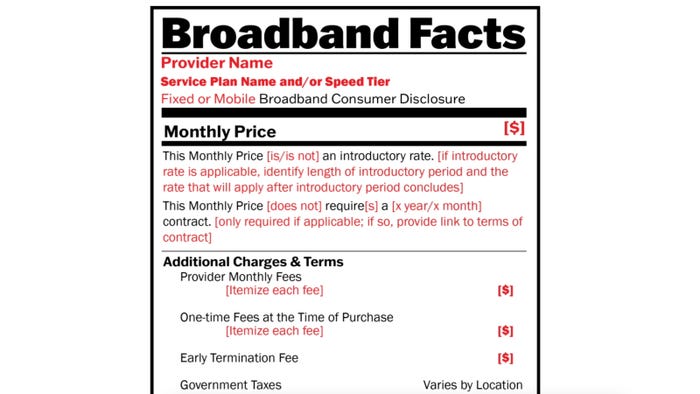Industry groups raise more issues with broadband nutrition labels
Select broadband labeling requirements, such as those tied to 'alternative' sales channels, are 'wholly unwarranted' and put unnecessary and complex burdens on operators, industry orgs told the FCC.

A handful of cable and telecom industry organizations recently reasserted arguments that certain requirements linked to the FCC's new nutrition-style broadband labeling order are "wholly unwarranted."
A specific quibble centers on directing customers to the labels, which provide data on elements such as broadband speeds and pricing, via "alternative" sales channels, such as by phone or in-store sales.
"Requiring that providers collect identifying information and document every customer interaction would be highly disruptive to consumers seeking information through alternative sales channels and would impose significant burdens on providers of all sizes," the organizations claimed in an August 9 meeting with FCC officials.

A sample of the new FCC broadband nutrition label.
(Click here to see the label design in full. Source: FCC.)
According to an ex parte filing (PDF) describing the meeting, representatives for the following organizations attended the meeting as a unified front: CTIA, ACA Connects; NTCA – The Rural Broadband Association; USTelecom; and NCTA – The Internet & Television Association.
During the meeting, the industry groups urged the Commission to clarify whether a broadband service provider satisfies the new labeling rules by "developing appropriate business practices" to promote the distribution of the labels through those alternative sales channels and to retain documentation of those practices for a period of two years.
They also argued that requiring broadband service providers to display pass-through fees imposed by federal, state or local government agencies on the labels "is an unwarranted departure" and would add "unnecessary complexity and burdens" that could result in some providers having to create many labels for any given plan.
Some broadband providers, they argued, might have to create "tens of thousands of labels" to comply with the requirement.
"These unnecessary burdens would be felt by both small and large providers," they argued.
A proposed remedy is for the FCC to require broadband operators to include an "explanatory statement that such fees may apply and that they vary by jurisdiction, similar to the Commission's treatment of government-imposed taxes." Alternatively, they proposed requiring the display of the maximum level of government-imposed fees that might be passed through, "so that consumers would not experience bill shock with respect to such fees."
The FCC published rules for the broadband nutrition labels last November, and followed with a further notice of proposed rulemaking that sought comment on unresolved questions, such as those tied to pricing and bundles, label accessibility, performance metrics, service reliability and providing labels in multiple languages. Several industry groups put forth their initial responses in March 2023.
Labeling rules 'look deceptively simple'
The new broadband labeling rules were among the topic of discussion recently at The Independent Show, an annual event focused on small and midsized cable operators and telcos hosted by ACA Connects and the National Content & Technology Cooperative (NCTC).
Brian Hurley, chief regulatory counsel at ACA Connects and one of the association representatives that attended the August 9 meeting at the FCC, noted that the new labeling rules "look deceptively simple," but are saddled with significant challenges with respect to implementation. He urged the audience to start to consider how to tackle those challenges, including multi-language requirements and the need to create a link to machine-readable versions of the labels.
Paul Hudson, a partner at Davis Wright Tremaine, noted that timing for compliance isn't imminent, but that independent operators should plan to be ready for the new rules by the fall of 2024. That prep includes record-keeping requirements and how the labels need to be presented online and in stores, and even by phone, he noted.
The accessibility requirements "can be a major undertaking," Hudson warned.
Chris Thomas, general counsel and head of government affairs at MCTV, an independent service provider, suggested that operators get their teams together now and "over-invite" by including any staffers who might have input, including people from IT, marketing, customer service and website management.
Sara Cole, regulatory counsel at TDS, echoed that, noting that the company has already shared the order internally with all groups that might be impacted. TDS, she said, has formed a team to work through the item.
Thomas suggested that operators create a portal that can track ongoing changes to broadband plans that will need to be carried through to updated labeling. "It's the moving parts that make it more difficult," he said.
Related posts:
— Jeff Baumgartner, Senior Editor, Light Reading
About the Author(s)
You May Also Like












